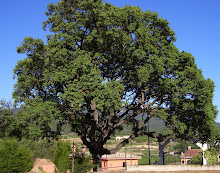Exercises in translation (I)
Unauthorized translation of an op-ed piece by Almudena Grandes that appeared in Spanish in El País Semanal (June 7, 2009):
A GRAIN OF WHEAT
Newly-made books have an agreeable smell, like spring. Spring smells like new books; this undescribable fragrance for which there are neither adjectives nor possible synonyms, the smell that emit brand-new plastified covers, the intactness of the adolescent spines, still smooth, without a wrinkle. Old books, those that put on a tenacious, yellowish patina, smell equally agreeable but their aroma is different. Read books smell like other people’s lives, mysterious lives led by unknown others, men with rough skin, women with polished nails, who held them in their hands when they were new and smelled like spring, when they still emitted the perfume of newly-made books, paper, ink, and love. Above all, love.
Love inspired by books is a complex passion, as difficult to explain as life – that is nourished by them and of which they feed. Love that summons an author and a reader around an excellent piece of design; this so simple and so perfect object, so cheap, so versatile, so easy to use and so often to reuse, light, small, easily portable and rigorously docile to its owner’s will, because it works without batteries or outlets, because it does not freeze nor does it need updates, because – apart from some primary education – it does not need any special knowledge, and it can be used as well underneath the earth as at an altitude of 9.000 feet (sic!) – how do people who do not read bear transoceanic flights? – it’s one of these loves that change anybody’s life. For this reason it is justified that spring loves books and that books fall in love with spring.
Writing a book means creating a deserted island and desiring passionately a shipwreck. Every book that is published is a new point, a black speck, round and tiny, in the neverending blue of knowledge, of human thinking. Every author has created it with its beaches and volcanoes, its coves and its dangers, its jungles, its deserts. And he or she has seen to it that it be habitable, has filled its seas with fish and its woods with wildlife, has hid under its strategic rocks springs of drinking water, has fertilized conscientiously its plains for the sowing of fruit and coconut trees, and has lifted itself to the height of God, even though he or she has needed many more than six days to create all this and to check that it is good.
After that, irremediably human again, they have kept their findgers crossed and desired with all of their strength that a ship might sink near its shores, that at least one male or female survivor let themselves save by the waves to then regain conscience lying in the sand. From this point on all the power is with the shipwrecked. On his or her will depends if this island gives up being deserted, grows, expands, consolidates as a fertile and mighty continent; or if this black speck, hazardously abandoned by the maps, loses its form and its color, shrinks in size until there is nothing left but a brown shadow, later on grey, a blurred, fragile, dusty memory, finally nothing.
It is clear that Robinson Crusoe changed my life. It did not change yours? You cannot imagine the envy I feel because this means that you can still read it for the first time. That you can still experiment this supreme emotion of the moment when Robinson leaves his hut, looks on the ground as he does every day, and discovers there a small green, tender plant that is familiar to hin because it is wheat; a grain of wheat that has come all the way there nobody knows how; because he had looked eagerly for the grain transported by his ship without ever finding it; and still, one solitary grain mus thave kept stuck to a wooden board, a box, in the depth of a sack, to losen itself on time, to fall into the earth and receive the rainwater, to sun’s warmth until its hidden germination. Oh, what a sublime trick; oh, what majestic work of art; oh, what glorious daring; oh, what a marvellous milling wheel of those that in the moment of swallowing them nourish more than bread! How many grains of wheat still await us in all those books tha we still need to read!
If you go out on the street, if you let yourself guide by the sun’s will during the slow, lazy mornings of this spring that is eager to become summer, you will find more than you could carry home in half a dozen plastic bags. It is possible that they are already, right now, calling you, that they cry out your first and also your family names, because even though you might not believe it, they already know you. Go meeting them, do not doubt. Look at them, touch them, breathe them in, succumb to the ink’s drunkenness that flows from the sides of all the huts in all the fairs open in nearly every Spanish city, and breathe in their perfume. Because newly-made books smell agreeable all year round, but when their smell mixes with that of spring, they fabricate an aroma very much comparable to the perfume of happiness.
© original text: Almudena Grandes, El País Semanal, 2009
© translation: this blogger, 2009
On Amazon.com I was not able to find any work by Grandes translated into English.
Happy World Book Day 2024!
3 days ago






No comments:
Post a Comment